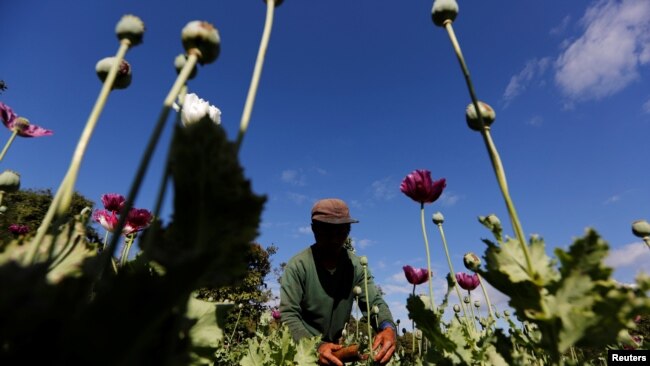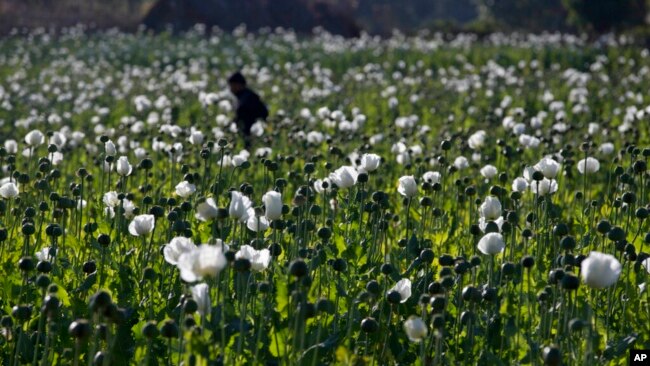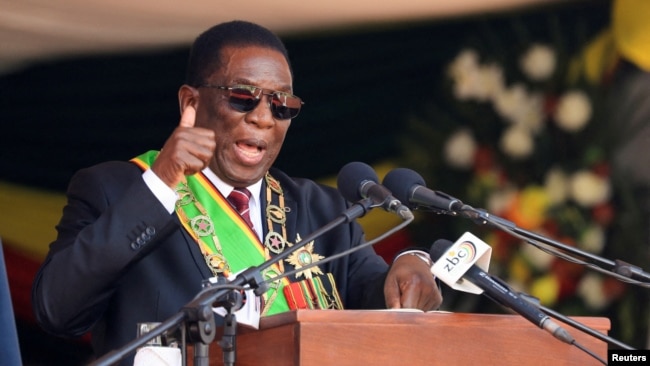미얀마의 아편 생산량은 수년간 감소한 후 급증하고 있다고 합니다
Myanmar’s Opium Production Said to be Surging After Years of Decline
페이지 정보
작성자 Zsombor Peter 작성일 23-01-26 04:14 댓글 0본문

파일 - 11월 미얀마 카야 주 로이코 외곽의 아편 밭에서 한 남성이 아편을 수확하고 있습니다
FILE - A man harvests opium as he works in an opium field outside Loikaw, Kayah state, Myanmar, Nov. 30, 2016.
방콕 —입니다
BANGKOK —
유엔의 최근 자료에 따르면, 미얀마의 농부들은 밀수품의 가격 상승과 일자리 감소로 인해 거의 10년 동안의 감소를 반전시키는 경제 침체 속에서 아편 양귀비 재배로 다시 몰려들고 있습니다.
Myanmar’s farmers are flocking back to opium poppy cultivation amid rising prices for the contraband crop and an economic nosedive that’s wiping out jobs, reversing nearly a decade of declines, according to the latest data from the United Nations.
유엔 마약범죄국은 목요일 발표한 보고서에서, 미얀마 양귀비 작물을 추적하기 시작한 2002년 이래로 생산량이 최고치를 기록했다고 밝혔습니다. 이는 미얀마의 양귀비 작물을 사들이고 최종 생산품인 헤로인을 국외로 밀반출하는 무장 단체들의 새로운 투자 때문입니다.
The U.N. Office on Drugs and Crime says in a report issued Thursday that yields are also the highest they’ve been since it started tracking Myanmar’s poppy crops in 2002, owing to new investment from the armed groups buying up the harvests and trafficking the end product — heroin — out of the country.
미얀마는 이 지역의 필로폰 대부분을 공급하는 것 외에도 아프가니스탄에 이어 세계 2위의 아편 생산국이며, 동아시아와 동남아시아 대부분의 주요 공급원입니다.
Besides supplying most of the region’s methamphetamine, Myanmar is the world’s second-largest producer of opium, after Afghanistan, and the main source for most of East and Southeast Asia.
UNODC의 목요일 보고서인 미얀마 아편 조사 2022에 따르면, 지난해 미얀마 농부들은 2021년보다 33% 증가한 4만100헥타르로 추정되는 양귀비를 재배했습니다. 이 기관은 또한 양귀비 재배가 마지막으로 정점을 찍은 2013년 이후 미얀마에서 양귀비 재배 면적이 57,800헥타르로 가장 많다고 보고했습니다. 2020년에는 재배 면적이 30,000 헥타르 이하로 감소했습니다.
According to the UNODC’s Thursday report, Myanmar Opium Survey 2022, the country’s farmers grew an estimated 40,100 hectares of poppy last year, up 33% from 2021. The agency also reported the most area under poppy cultivation in Myanmar since 2013, when poppy farming last peaked, at 57,800 hectares. Cultivation had dipped to under 30,000 hectares in 2020.
UNODC의 동남아시아 및 태평양 담당 대표인 제레미 더글라스는 2021년 2월 쿠데타 이후 경제가 추락한 탓이 크다고 말했습니다. 반대자들에 대한 군부의 유혈 진압은 여러 차례의 서방 제재를 촉발시켰고 많은 외국인 투자자들을 쫓아냈습니다.
The UNODC’s representative for Southeast Asia and the Pacific, Jeremy Douglas, ascribed much of the uptick to the economy’s tumble since the country’s February 2021 coup. The military’s bloody crackdown on opponents has triggered multiple rounds of Western sanctions and driven many foreign investors away.
더글러스는 VOA에 "오피움은 미얀마에서 수십 년 동안 최후의 수단의 고용주였습니다,"라고 말했습니다.
“Opium’s been an employer of last resort for decades in Myanmar,” Douglas told VOA.
"많은 사람들이 생계를 유지할 다른 방법이 없었기 때문에 아편으로 돌아갈 수밖에 없었습니다. 그는 "양곤이나 만달레이 같은 곳이나 다른 지역에서는 일자리가 고갈됐고, 사람들은 떠났다가 다시 농촌으로 돌아가 농사를 지었다"고 말했습니다.
“Many people have had no choice but to go back to opium because they have had no other way to make a living. Jobs have dried up in places like Yangon or Mandalay or other parts of the country, and people have left and returned back to rural areas, returned to farming,” he said.
세계은행은 미얀마 경제가 2021년에 18% 수축했으며, 2020년 이후 빈곤이 두 배로 증가해 인구의 40%가 국가 빈곤선 아래로 떨어졌다고 밝혔습니다. 그것의 자체 조사는 많은 사람들이 농장을 위해 도시를 버림으로써 일자리 감소의 물결에 대처하는 것을 발견했습니다.
The World Bank says Myanmar’s economy contracted 18% in 2021 and that poverty has doubled since 2020, leaving 40% of the population below the national poverty line. Its own surveys have found many people coping with a wave of job losses by ditching the cities for farms.
미얀마의 일부 지역에서는 양귀비 농사를 의미할 가능성이 점점 높아지고 있습니다. 특히 미얀마 동부의 샨 주에서는 양귀비 작물의 대부분을 재배하고 있습니다.
In some parts of Myanmar, that is increasingly likely to mean farming poppy. It is especially true in eastern Myanmar’s Shan state, which grows the bulk of the country’s poppy crop.
미얀마는 또한 마약 거래에서 오랜 역사를 가진 미얀마에서 가장 강력한 반군들의 본거지이기도 합니다. UNODC는 작년에 다른 주에서도 양귀비 재배가 확대된 것을 발견했지만, 샨에서 가장 큰 폭으로 증가했습니다.
The state is also home to some of Myanmar’s most powerful rebel armies, with long histories in the drug trade. While the UNODC found poppy farming expanded last year in other states as well, it saw the largest jumps, by far, in Shan.
더글러스는 농민들이 지역 반군 단체로부터 받는 추가적인 인센티브 때문이라고 말했습니다. 반군 단체 중 일부는 주로 중앙 정부로부터 독립적으로 주 내에서 자신들의 "특별 지역"을 운영하고 있습니다.
Douglas said that is because of the added incentives farmers there are getting from local rebel groups, some of which run their own “special regions” inside the state, largely independent of the central government.
"기본적으로, 사람들은 가족을 부양하기 위해 돈을 벌어야 하기 때문에 [양귀비]를 기르고 있습니다. 그것은 가난과 경제에 관한 것입니다," 라고 그가 말했습니다.
“Fundamentally, people are growing [poppy] because they need to make money to support their families. It’s about poverty and economics,” he said.

파일 - 1월에 미얀마 북부 샨 주의 남팟카 마을에서 한 마을 사람이 번창하는 양귀비 밭을 걷고 있습니다
FILE - A villager walks in a flourishing poppy field at Nampatka village, Northern Shan state, Myanmar on Jan. 27, 2014.
"그러나 북부 샨 지역의 대표들이 와서 격려하고 있습니다... 특별한 지역 밖에서는 씨앗, 비료, 경우에 따라서는 관개 장비를 제공합니다."라고 그는 덧붙였습니다. "그들은 농부들에게 투자를 하고 있고, 샨은 그들이 그것을 한 곳입니다."
“However, there’s been an encouragement by representatives from north Shan special regions coming ... outside the special regions providing seeds, fertilizer and in some cases irrigation equipment,” he added. “They’re making an investment in the farmers, and Shan is the place [where] they have done it.”
그는 미얀마 소수민족 와족의 자치권을 위해 싸우고 있다고 주장하는 강력한 미국 육군이 운영하는 특수 지역 2에서 많은 도움이 오고 있는 것 같다고 말했습니다. 그 나라의 대부분의 반군들은 그 나라의 많은 소수 민족들 중 하나와 동맹을 맺고 있습니다.
He said much of the help seems to be coming from Special Region 2, run by the powerful United Wa State Army, which claims to be fighting for autonomy for Myanmar’s ethnic minority Wa. Most of the country’s rebel armies align with one of its many ethnic minorities.
유엔의 위성 데이터는 특별 지역 2 내부에서 양귀비 농사의 흔적을 거의 발견하지 못했지만, 위성과 현장 방문은 바로 옆집에서 양귀비 농사를 많이 발견했습니다. 편리하게도, 특별 지역 2는 미얀마의 아편과 헤로인의 주요 시장인 중국과의 국경을 따라 운영되고 있습니다.
While the U.N.’s satellite data picked up little sign of poppy farming inside Special Region 2 itself, satellites and field visits found plenty of it just next door. Conveniently, Special Region 2 also runs along Myanmar’s border with China, the main market for the country’s opium and heroin.
미국 마약단속국의 미얀마 사무소를 수년간 운영해온 존 웰런씨는 미얀마의 무수한 반군 단체들이 군부와 연대하든 반대하든 간에 미얀마의 아편 거래에서 역할을 해왔다고 말했습니다.
John Whalen, who ran the U.S. Drug Enforcement Administration’s Myanmar office for many years, said most of the country’s myriad rebel groups have played a role in the country’s opium trade over the years, whether aligned with or against the military.
"그리고 저는 그들이 다양한 수준에 계속 관여하고 있다고 생각합니다,"라고 현재 미얀마에서 민간 위험 컨설팅을 운영하고 있는 Whalen은 VOA에 말했습니다.
“And I think they continue to be involved in various levels,” Whalen, who now runs a private risk consultancy in Myanmar, told VOA.
"어떤 경우에는 재배와 생산에서부터 국외로의 궁극적인 운송과 유통에 이르기까지 모든 것에 관여하는 그룹이 있습니다. 다른 경우에는 민족적인 [무장] 그룹이 [의약품] 정제소에 보안을 제공하는 데 참여하거나 단순히 운송 측면에 참여할 수도 있습니다. 그룹에 따라 다를 것입니다."
“In some cases, you have a group that’s involved in everything from the cultivation and production to the ultimate transportation and distribution out of the country. Other times you’ll have an ethnic [armed] group’s involvement maybe in providing security for a [drug] lab or refinery, or their involvement may be simply in the transportation aspect of it. It would vary depending on the group.”
UNODC 자료에 따르면, 미얀마는 아프가니스탄에 대한 아편 양귀비 재배에서 여전히 먼 2위를 차지하고 있으며, 아프가니스탄은 작년에 약 233,000 헥타르를 재배했습니다.
Myanmar still comes a distant second in opium poppy farming to Afghanistan, which grew some 233,000 hectares of it last year, according to UNODC data.
그러나 더글러스 대변인은 미얀마의 헤로인은 여전히 세계 최고로 여겨지고 있으며, 최근의 급증으로 인해 미얀마의 제품이 유럽과 미국을 포함한 아시아를 넘어 시장으로 되돌아갈 가능성이 있다고 말했습니다. 그의 팀이 미얀마에서 진행 중인 현장 조사는 미얀마의 다음 양귀비 수확량이 지난 번보다 훨씬 더 많을 것임을 시사합니다.
But Douglas says Myanmar’s heroin is still considered the best in the world, and that the recent surge may portend the return of the country’s product to markets beyond Asia, including Europe and the United States. His team’s ongoing field work in Myanmar suggests the country’s next poppy harvest will be even bigger than the last.
UNODC는 이 지역 국가들에 아편을 헤로인으로 정제하는 데 필요한 통제된 화학물질의 샨으로의 밀거래를 단속할 것을 촉구하고 있습니다. 주로 아세트산 무수물입니다. 미얀마와 국경을 맞대고 있는 중국과 인도는 세계의 대부분의 물자를 생산합니다.
The stem the tide, the UNODC is urging countries in the region to crack down on the trafficking of the controlled chemicals needed to refine opium into heroin, mainly acetic anhydride, into Shan. China and India, which both border Myanmar, make most of the world’s supplies.
"헤로인은 아세트산 무수물 없이는 만들어질 수 없으며, 여전히 생산 지역에 들어갑니다."라고 더글러스는 말했습니다. "지역, 특히 이웃 국가들이 이 문제를 해결해야 합니다."
“Heroin can’t be made without acetic anhydride, and it still gets into production areas,” Douglas said. “The region, and particularly neighboring states, have to deal with it.”
미얀마의 국영 마약 남용 통제 중앙 위원회는 매년 수천 헥타르의 양귀비 밭이 근절되고 있다고 주장하고 있습니다. 하지만 20년간의 데이터는 양귀비가 실제로 매년 얼마나 많이 재배되는지에 대한 어떤 영향도 거의 보여주지 않습니다. UNODC는 그것이 효과가 없다고 믿고 있습니다.
Myanmar’s state-run Central Committee for Drug Abuse Control claims thousands of hectares of poppy fields are eradicated each year. But two decades of data show little if any effect on how much poppy is actually grown each year, and the UNODC believes it just doesn’t work.
웨일런은 또한 공식 수치의 정확성에 의문을 제기했습니다. 그는 정부가 계절을 위해 이미 식물을 수확한 후 개간한 양귀비 밭을 종종 세어 "이것은 목적을 깨뜨리는 것"이라고 말했습니다
Whalen also questioned the accuracy of the official figures. He said the government would often count poppy fields it cleared after the plants had already been harvested for the season, “which kind of defeats the purpose.”
그럼에도 불구하고, 현재 전국적인 무장 저항과 싸우고 있는 군사 정권에 의해 운영되는 중앙 위원회는 지난 해 UNODC에 2021년 4,633헥타르에서 1,403헥타르로 근절이 급격히 감소했다고 보고했습니다.
Even so, the central committee, now run by a military junta stretched thin fighting a nationwide armed resistance, reported a sharp drop in eradication to the UNODC last year, from 4,633 hectares in 2021 to 1,403.
더글러스와 웨일런은 이 문제에 대한 진정한 해결책은 강력한 경제와 농부들과 실업자들을 위한 양귀비 재배에 대한 실행 가능한 대안이 포함될 것이라고 말합니다.
Douglas and Whalen say a real solution to the problem will include a strong economy and viable alternatives to growing poppies for farmers and the under- or unemployed.
왈렌은 "풀뿌리 수준과 농부들을 보면, 그들은 그것을 현금 작물로 보고 가족을 부양하려고 할 뿐입니다,"라고 말했습니다. "그래서, 거기서부터 당신은 그것을 다루기 시작해야 합니다
“If you look at it at the grassroots level and the farmers, they see it as a cash crop and they’re simply trying to provide for their family,” Whalen said. “So, that’s where you’ve got to start addressing it.”
출처 : VOANews
댓글목록 0
등록된 댓글이 없습니다.

















